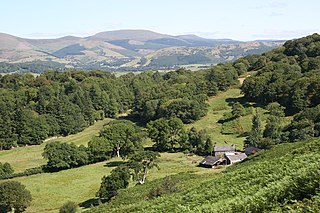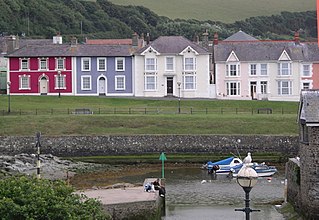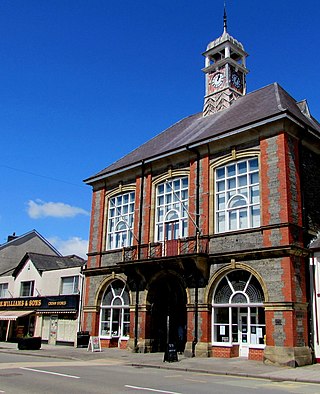
Ceredigion ( ), historically Cardiganshire, is a county in the west of Wales. It borders Gwynedd across the Dyfi estuary to the north, Powys to the east, Carmarthenshire and Pembrokeshire to the south, and the Irish Sea to the west. Aberystwyth is the largest settlement and, together with Aberaeron, is an administrative centre of Ceredigion County Council.

Aberaeron, previously anglicised as Aberayron, is a town, community and electoral ward in Ceredigion, Wales. Located on the coast between Aberystwyth and Cardigan, its resident population was 1,274 in the 2021 census.

Ceredigion County Council is the governing body for the county of Ceredigion, since 1996 one of the unitary authorities of Wales. The council's main offices are in Aberaeron.
Cardiganshire County Council was the local government authority for the county of Cardiganshire, Wales, between 1889 and 1974. It was superseded by Dyfed County Council.

Edward Haycock Sr. was an English architect renowned for his work in the West Midlands and central and southern Wales during the late Georgian and early Victorian periods.
Ceredigion District Council was one of six district-level authorities in the county of Dyfed, Wales, from 1974 until 1996. The district had an identical area to the pre-1974 administrative county of Cardiganshire. From its creation in 1974 the district used the name "Ceredigion" rather than "Cardiganshire", which had been used for the former county council. Further local government reorganisation in 1996 saw Dyfed County Council abolished and Ceredigion become a unitary authority, with the district council taking over county-level services to become Ceredigion County Council.

Aberystwyth Town Hall is a municipal structure in Queen's Square, Aberystwyth, Wales. The structure, which was the headquarters of Aberystwyth Borough Council, has operated since 2012 as a public library and a pensioners' day centre.

Lampeter Town Hall is a municipal structure in the High Street, Lampeter, Wales. The town hall, which was the meeting place of Lampeter Borough Council, is a Grade II listed building.

Laugharne Town Hall is a municipal building in Market Street in Laugharne, Carmarthenshire, Wales. The structure, which is the meeting place of Laugharne Corporation, is a Grade II* listed building.

Llandovery Town Hall is a municipal building in Market Street, Llandovery in Carmarthenshire, Wales. The structure, which is used as the local public library, is a Grade II listed building.

Narberth Town Hall is a municipal building in the High Street, Narberth, Pembrokeshire, Wales. The structure, which is currently used as a shop, is a Grade II listed building.

Bala Town Hall, known in the late 19th century as the County Hall, is a municipal building in Bala, Gwynedd, Wales. The structure, which is now used as a restaurant, is a Grade II listed building.

Tremadog Town Hall is a municipal building on Stryd Fawr, in Tremadog, Gwynedd, Wales. The structure, which was most recently used as a shop, is a Grade II* listed building.

The Old Town Hall is a municipal building in Temple Street, Llandrindod Wells, Powys, Wales. The structure, which accommodates the offices of Llandrindod Wells Town Council, is a Grade II listed building.

Pembroke Town Hall is a municipal building in Main Street, Pembroke, Pembrokeshire, Wales. The structure, which is the meeting place of Pembroke Town Council, is a Grade II listed building.

Crickhowell Market Hall, formerly Crickhowell Town Hall, is a municipal building in the High Street, Crickhowell, Powys, Wales. The structure, which accommodates market stalls on the ground floor and a café on the first floor, is a Grade II* listed building.

Brecon Guildhall, is a municipal building in the High Street, Brecon, Powys, Wales. The structure, which is the meeting place of Brecon Town Council, is a Grade II listed building.

Alban Square, in the centre of Aberaeron, Ceredigion, Wales is a range of early 19th century townhouses. The town of Aberaeron was developed around 1810 as a port by the Rev. Alban Thomas Jones Gwynne, a local landowner. After his father's death in 1819, Colonel A.T.J. Gwynne engaged Edward Haycock Sr. to plan a major expansion. Leases were sold in the early 1830s and Alban Square was designed, but largely unbuilt, by 1834. The town grew as a centre for shipbuilding and commerce. The expansion of the railways, and their arrival in Aberaeron in 1909 brought these commercial endeavours to an end and the town became a seaside resort and a centre for local government. No.s 9-20 inclusive on Alban Square are Grade II* listed buildings, their Cadw listing records describing the square as "a well preserved terrace in a key location".

Portland Place, in the centre of Aberaeron, Ceredigion, Wales is a terrace of mid-19th century townhouses. The town of Aberaeron was developed around 1810 as a port by the Rev. Alban Thomas Jones Gwynne, a local landowner. After his father's death in 1819, Colonel A.T.J. Gwynne engaged Edward Haycock Sr. to plan a major expansion. Leases were sold in the early 1830s and development continued for much of the rest of the 19th century, the town growing as a centre for shipbuilding and commerce. The expansion of the railways, and their arrival in Aberaeron in 1909 brought these commercial endeavours to an end and the town became a seaside resort and a centre for local government. No.s 1-7 inclusive on Portland Place are Grade II* listed buildings, forming "the finest single terrace" in Aberaeron.

The Old Shire Hall is a former judicial building in the High Street in Cardigan, Ceredigion, Wales. The structure, which is now used as a British Red Cross shop, is a Grade II* listed building.



















